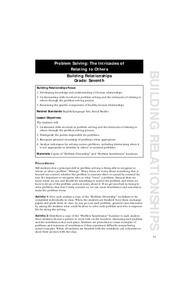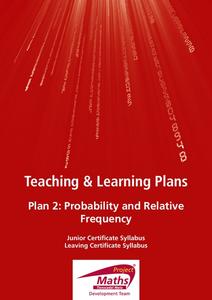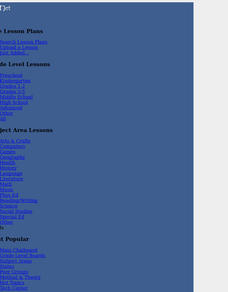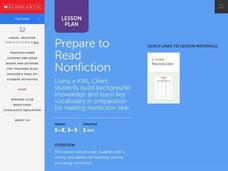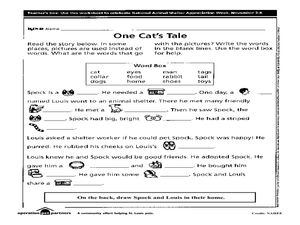Learning for Life
Building Relationships
Understanding how to relate to others and participate in healthy human relationships is an important life skill for young learners to develop. Learners will use the worksheets to discuss problem solving in human interactions, and how...
University of the Desert
What Is Culture?
Introduce your class to the meaning of culture with this great collection of activities and materials. After reviewing quotes from young adults around the world, learners then construct metaphors describing culture and discuss the...
Code.org
Personal Innovations
Here's a resource designed to serve as an introduction to a computer science course. Groups brainstorm an innovation that may improve technology or use technology to solve a problem. The plan guides the teacher through the introduction...
Charleston School District
Solving Systems with Elimination
Can you handle one more method? It just might be your favorite! Building on the skills learned in the previous lessons in the series, scholars now learn the elimination method. The video examines problems of varying difficulty.
Charleston School District
Evaluation of Roots
You mean the square root of five and five don't have the same value? Learners estimate the value of irrational roots. As they practice estimating the value, they increase their understanding of roots. The lesson is the fourth in a series...
DiscoverE
Launch It
Launch pupil interest in rockets. Scholars build rockets out of straws and balloons to learn about Newton's Third Law of Motion. Their task is to hit a target five feet away. It's not as easy as it seems!
DiscoverE
Nanomedicine
Cancer patients need as much help as they can get. Future engineers design a system that delivers cancer medicine to the lungs but doesn't harm other organs. Using ferrofluids and iron particles, they test out their delivery systems.
DiscoverE
Harmless Holder
Here's a lesson that's not for the birds! Scholars design and build packaging for soda cans that is environmentally friendly. These packages must be durable, easy to carry, and have no environmental impact.
Washington Education Association
Preparing a More Useful Sub Plan for Your Substitute Teacher
Make your substitute's life easier by using the prompts on a one-page resource to a craft a profile of your classes and your daily routines. A great-first page for a substitute teacher folder.
PBS
The Sixties: Dylan Plugs in and Sells Out
Before Woodstock, there was Newport. Get plugged in to the social changes of the 1960s with a lesson that looks at Bob Dylan's performance at the 1965 Newport Folk Festival as a symbol of the radical changes that marked the era.
DiscoverE
Coding Without Computers
See what it feels like to be a robot. Scholars use programming vocabulary to program a human robot and test out their codes by acting them out. The code should result in stacking six cups into a pyramid.
Project Maths
Probability and Relative Frequency
It's all relatively simple once you get the gist. Young mathematicians learn about sample spaces and simple probability by conducting an activity with dice. To complete the second of six parts in the Statistics and Probability unit, they...
Curated OER
Character in a Box
Partners choose, research, and analyze fictional or historical characters and design character life boxes to represent them. They also compose a rhyme royal, which they understand inductively by deconstructing examples. Based largely on...
San Francisco Public Utilities Commission
Let's Save Water: Water Conservation
Did you know that cutting down your shower by one minute a day can save five gallons of water? Learn about water conservation with a science reading activity. After kids finish reading key terms and water-saving tips in a reading...
Curated OER
How Does Who I Am Relate to Employability?
Sixth graders participate in question and answer sessions and develop a skill-based resume. They identify and explain resume-writing situations in which an ethical dilemma may present itself. Finally, 6th graders identify and project the...
Curated OER
Introducing the Concept: Percents
Students explore the math concept of percents. In this percents lesson, students examine visual examples of the relationships among fractions, decimals, and percents. Students also practice solving problems that their instructors model.
Lycoming College
An Author Study of Jan Brett
Jan Brett, the author of many beloved children's books, is well worth a study. Try out this winter-themed unit, which covers areas of language arts as well as art, math, science, and social studies.
Teachers.net
Chicka-Chicka-Boom-Boom/ Chicka Challenge (Elementary, Literature)
Is your Kindergarten class about to read the book, Chicka-Chicka-Boom-Boom? If they are, and you want a few wonderful activity ideas to reinforce phonemic awareness and letter identification skills, look no further. Here you'll find over...
Pimsleur
The Weather
What's it like out today, and what do you plan to wear? These are the two main topics for this Italian lesson plan. By the end of the plan, pupils should have a grasp of basic weather and clothing terms as well as a general understanding...
Curated OER
Are You Ready for a Dog?
Students explore the role of pet ownership. In this pet responsibilities lesson, students discuss the responsibilities of pet ownership as well as the costs associated with it. Students discuss methods of adopting dogs.
Curated OER
Prepare to Read Nonfiction
Pupils get an introduction to using KWL Charts as tools for reading nonfiction. They study unfamiliar words and share what they already know about the topic of the non-fiction selection and use this knowledge to help prepare to read.
Curated OER
Fabulous Felines: How to Choose the Purrfect Cat
Pupils investigate the concept of pet care and cats. In this cat lesson, students discuss responsibilities for pet care and take a cat quiz. Pupils discuss where to get their cats and how to care for them. Students may visit an animal...
Curated OER
Introduction to Nutrition
Students investigate the five food groups. In this nutrition lesson, students track their food over the weekend, and see if they are eating healthy. Then students get an opportunity to track their eating again to see if it improves.
Curated OER
Ocean Exploration: How Doea you Data Grow? (Grades 7-8)
Learners explore fieldwork. In this seventh or eighth grade mathematics lesson, students watch a video on data collection in the field. Learners use fieldwork to gather data about their school environment. Students compile data in...


